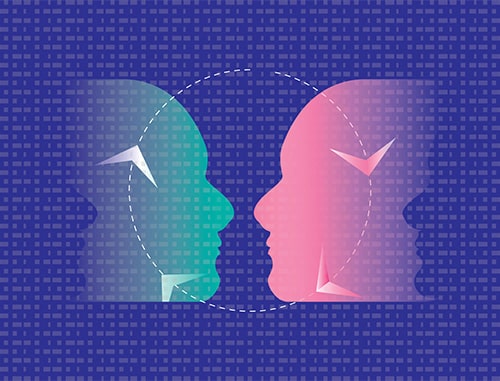
Stories show us how to bear the unbearable, approach the unapproachable, conceive the inconceivable. Stories provide meaning, texture, layers and layers of truth.
Joseph Campbell
October 31, 2022
Every one of us has a story worth telling—our stories are what gives our lives meaning.
The stories of the individuals whose lives we touch connect us in a way that very few things do. They show us a world beyond our own—a world where we get to walk alongside another, seeing things from a lens that is different from our own.
Stories give us what the poet Mary Oliver calls the “sustentation of empathy”—an ability to see a truth different from our own, but equally as valuable, as poignant, as full of hope and fear, experience, and triumph as the narratives of our own lives.
Stories provide us an opportunity to learn from another person’s experience and can shape, strengthen, or challenge our opinions and values. When a story catches our attention and engages us, we are more likely to absorb the message and meaning. And when we hear the stories of those we serve, we are reminded why we do the work we do.
When we hear about the defining moment in people’s lives, where they were transformed by a new skill, a new opportunity, critical resources, words of encouragement, our sense of purpose is heightened.
A growing body of brain science offers even more insight into what’s behind these experiences.
According to Liz Neely, Director of the Story Collider, “On functional MRI scans, many different areas of the brain light up when someone is listening to a narrative. One study of listeners found that the brain networks that process emotions arising from sounds—along with areas involved in movement—were activated, especially during the emotional parts of the story.”
As you hear a story unfold, your brain waves actually start to synchronize with those of the storyteller, says Uri Hasson, professor of psychology and neuroscience at Princeton University. When he and his research team recorded the brain activity in two people as one person told a story and the other listened, they found that the greater the listener’s comprehension, the more closely the brain wave patterns mirrored those of the storyteller.
At the end of November, The Fedcap Group will be hosting our annual Celebration of The Power of Possible Gala. Our theme, Bridging the Distance to Economic Well-Being, provides the backdrop for the stories of individuals who have risen above life-defying odds to go on to not only survive, but also to thrive and ultimately to go on to help and inspire others.
I often reflect on the stories I have heard and the countless lives that have changed. And I am encouraged that every day new narratives are being created.
I look forward to hearing from you and how you use stories as a way to emphasize the impact of your work.
Las historias nos muestran cómo soportar lo insoportable, acercarnos a lo inaccesible, concebir lo inconcebible. Las historias proporcionan significado, textura, capas y capas de hechos reales.
José Campbell
31 octubre 2022
Cada uno de nosotros tiene una historia que vale la pena contar: nuestras estadísticas son lo que da sentido a nuestras vidas.
Las historias de las personas cuyas vidas tocamos, nos conectan de una manera que muy pocas cosas lo hacen. Nos muestran un mundo más allá del nuestro, un mundo donde podemos caminar junto a otro, viendo las cosas desde una perspectiva que es diferente a la nuestra.
Las historias nos dan lo que la poetisa Mary Oliver llama la “sustentación de la empatía”: la capacidad de mirar una verdad diferente a la nuestra, pero igualmente valiosa, tan conmovedora, tan llena de esperanza y miedo, experiencia y triunfo como las narrativas de nuestras propias vidas.
Las historias nos brindan la oportunidad de aprender de la experiencia de otra persona y pueden moldear, fortalecer o desafiar nuestras opiniones y valores. Cuando una historia nos llama la atención y nos involucra, es más probable que absorbamos el mensaje y el significado. Y cuando escuchamos las historias de aquellos a quienes servimos, se nos recuerda por qué hacemos el trabajo que hacemos.
Cuando escuchamos sobre el momento decisivo en la vida de las personas, donde fueron transformadas por una nueva destreza, una nueva oportunidad, recursos críticos, palabras de aliento; nuestro sentido de propósito se intensifica.
Un creciente grupo en la ciencia del cerebro ofrece aún más información sobre lo que hay detrás de estas experiencias.
Según Liz Neely, directora de “Story Collider”: “En las imágenes de resonancias magnéticas funcionales, muchas áreas diferentes del cerebro se iluminan cuando alguien está escuchando una narración. Un análisis de oyentes encontró que las redes cerebrales que procesan las emociones que surgen de los sonidos, junto con las áreas involucradas en el movimiento, se activan, especialmente durante las partes emocionales de la historia”.
A medida que escuchas cómo se desarrolla una historia, tus ondas cerebrales comienzan a sincronizarse con las del narrador, dice Uri Hasson, profesor de psicología y neurociencia en la Universidad de Princeton. Cuando él y su equipo de investigación registraron la actividad cerebral en dos personas mientras una persona contaba una historia y la otra escuchaba, encontraron que cuanto mayor era la comprensión del oyente, más de cerca los patrones de ondas cerebrales reflejaban las del narrador.
A finales de noviembre, The Fedcap Group organizará nuestra Gala anual “The Power of Possible”. Nuestro lema, “Bridging the Distance to Economic Well-Being”; proporcionará el telón de fondo para las historias de personas que se han elevado por encima de las adversidades que les desafían la vida para continuar no solo sobreviviendo, sino también procesando y, en última instancia, ayudando a inspirar a otros.
A menudo reflexiono sobre las historias que he escuchado, asi como de las innumerables vidas que han cambiado. Y me alienta que cada día se creen nuevas historias.
Espero saber de ustedes y del cómo usan las historias como una forma de enfatizar el impacto de su trabajo.